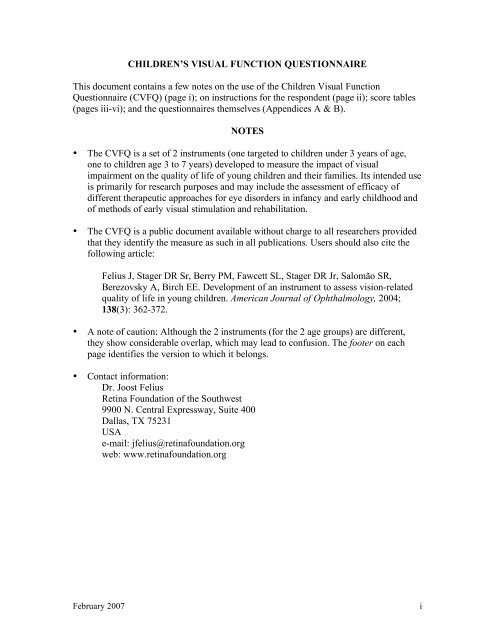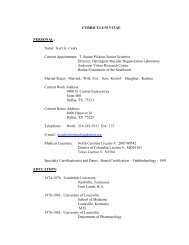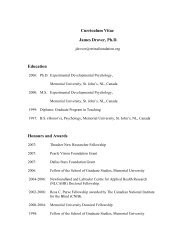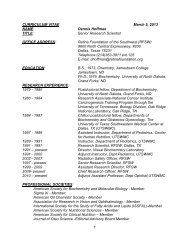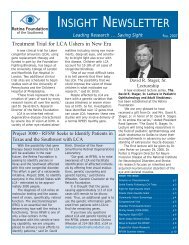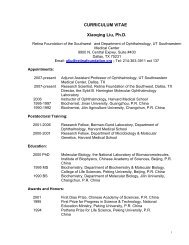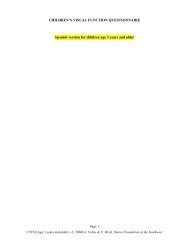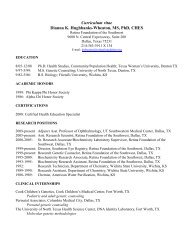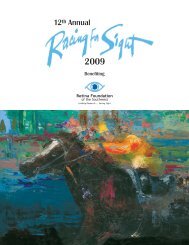CHILDREN'S VISUAL FUNCTION QUESTIONNAIRE This document ...
CHILDREN'S VISUAL FUNCTION QUESTIONNAIRE This document ...
CHILDREN'S VISUAL FUNCTION QUESTIONNAIRE This document ...
- No tags were found...
Create successful ePaper yourself
Turn your PDF publications into a flip-book with our unique Google optimized e-Paper software.
APPENDIX ACHILDREN’S <strong>VISUAL</strong> <strong>FUNCTION</strong> <strong>QUESTIONNAIRE</strong>Version for children under 3 years of agePage 1CVFQ (Age under 3 years) v.3; 2004©J. Felius & E. Birch, Retina Foundation of the Southwest
Please answer these questions about your child’s health and vision:1. In general, is your child’s overall health:Excellent Very Good Good Fair Poor2. At the present time, is your child’s eyesight when using both eyes:Excellent Good Fair Poor Very Poor Blind3. If your child has an eyesight problem for only one eye, is your child’s eyesight in theaffected eye:Excellent Good Fair Poor Very Poor BlindDoes not apply to my child4. Do you worry about your child’s eyesight?Never Once in a while Sometimes Often Always5. How much time do you spend on caring for your child’s vision (such as: eye doctorappointments, patching, eye drops, therapy)?Once a month or less (or never) Once a week Once a dayA few hours each day Most of the day6. Does the time you spend on your child’s vision (eye doctor appointments, patching,eye drops, therapy) take away from time you would like to spend with your otherchildren or husband/wife?Never Once in a while Sometimes Often Always7. Do you and other family members (your spouse or parents) argue about the medicalcare your child is getting or about treatment that the doctor has prescribed?Never Once in a while Sometimes Often AlwaysPage 2CVFQ (Age under 3 years) v.3; 2004©J. Felius & E. Birch, Retina Foundation of the Southwest
How does your child’s eyesight affect his/her activities?Please indicate how much difficulty your child has with the followingactivities because of his/her vision problem.Nodifficultybecause ofeyesightA littledifficultybecause ofeyesightModeratedifficultybecause ofeyesightExtremedifficultybecauseofeyesightCannot dothis at allbecauseofeyesightMy child istoo young toattempt this15. My child can feedhimself/herself.16. My child can recognizefaces (friends, relatives)across a room.17. My child can brushhis/her teeth.18. My child can washhis/her face.19. My child will track amobile or a moving toy.20. My child can locate asmall piece of food (araisin or Cheerio) andgrasp it.21. My child helps withchores.Page 4CVFQ (Age under 3 years) v.3; 2004©J. Felius & E. Birch, Retina Foundation of the Southwest
Questions about the treatment of your child’s eye condition.30. Is your child currently being treated for his/her eye condition? (Treatment includeseyeglasses, contact lenses, intraocular lenses, patching, eye drops, or othertreatment).Please circle one:YES / NOIf your answer to question 30 was NO, go to the next page.If your answer to question 30 was YES, please answer the following questions:NeverOncein aWhileSometimesOftenAlways31. I have trouble applying treatment (forexample, putting on an eye patch orglasses, giving eye drops or othermedication).32. My child is uncomfortable whentreated (for example, while wearing apatch or glasses or when you put ineye drops).33. My child is less active when treated(for example, when wearing a patchor glasses, or when taking eye dropsor medication).34. I worry when my child refusestreatment (for example, pulls off thepatch or glasses, or squeezes eye shutwhen trying to put in eye drops).35. I sometimes forget to treat my child.Page 6CVFQ (Age under 3 years) v.3; 2004©J. Felius & E. Birch, Retina Foundation of the Southwest
APPENDIX BCHILDREN’S <strong>VISUAL</strong> <strong>FUNCTION</strong> <strong>QUESTIONNAIRE</strong>Version for children age 3 years and olderPage 1CVFQ (Age 3 years and older) v.3; 2004©J. Felius & E. Birch, Retina Foundation of the Southwest
Please answer these questions about your child’s health and vision:1. In general, is your child’s overall health:Excellent Very Good Good Fair Poor2. At the present time, is your child’s eyesight when using both eyes:Excellent Good Fair Poor Very Poor Blind8. If your child has an eyesight problem for only one eye, is your child’s eyesight in theaffected eye:Excellent Good Fair Poor Very Poor BlindDoes not apply to my child9. Do you worry about your child’s eyesight?Never Once in a while Sometimes Often Always10. How much time do you spend on caring for your child’s vision (such as: eye doctorappointments, patching, eye drops, therapy)?Once a month or less (or never) Once a week Once a dayA few hours each day Most of the day11. Does the time you spend on your child’s vision (eye doctor appointments, patching,eye drops, therapy) take away from time you would like to spend with your otherchildren or husband/wife?Never Once in a while Sometimes Often AlwaysPage 2CVFQ (Age 3 years and older) v.3; 2004©J. Felius & E. Birch, Retina Foundation of the Southwest
We would like to know how you feel about your child’s vision.Please indicate how much you agree with each of the following statements.7. It bothers me when otherpeople comment aboutmy child’s vision or eyeswhen I take him/her to astore or mall.StronglyDisagreeDisagreeNotSureAgreeStronglyAgreeDoes notapply to mychild8. My child feels differentfrom other children.9. My child is happy most ofthe time.10. I notice other childrenlooking at my child.11. My child is teasedbecause of his/her visionproblems.12. My child makes newfriends easily.13. My child is affectionate.14. My child gets along wellwith our other childrenand friends.Page 3CVFQ (Age 3 years and older) v.3; 2004©J. Felius & E. Birch, Retina Foundation of the Southwest
How does your child’s eyesight affect his/her activities?Please indicate how much difficulty your child has with the followingactivities because of his/her vision condition.15. My child can recognizefaces (friends, relatives)across a room.Nodifficultybecause ofeyesightA littledifficultybecause ofeyesightModeratedifficultybecause ofeyesightExtremedifficultybecauseofeyesightCannot dothis at allbecauseofeyesightMy child istoo young toattempt this16. My child can dresshimself/herself.17. My child can brushhis/her teeth.18. My child can washhis/her face.19. My child can ride abicycle.20. My child can play a sportor active game (forexample, tag).21. My child can pour liquidinto a cup or glass.22. My child can dial atelephone.23. My child helps withchores.24. My child can tell whattime it is.25. My child can identifycoins.Page 4CVFQ (Age 3 years and older) v.3; 2004©J. Felius & E. Birch, Retina Foundation of the Southwest
How does your child’s eyesight affect his/her activities? (Continued.)Please indicate how much you agree with each of the following statements.StronglyDisagreeDisagreeNotSureAgreeStronglyAgreeDoes notapply to mychild26. My child enjoys lookingat books.27. My child’s eyesightmakes it difficult for him/her to learn to walk, run,skip, or jump.28. My child’s vision gets inthe way of his/herlearning.29. My child enjoys watchingtelevision, videos, orplaying video games.30. My child likes to travelon family vacations.31. My child enjoys playingwith others (sisters andbrothers or friends).32. My child enjoysdrawing, painting orother art activities.33. My child’s eyesightmakes it difficult for him/her to find something ona crowded shelf or in acloset.Please indicate how often this happens:NeverOncein aWhileSometimesOftenAlwaysMy child istoo young toattempt this34. My child trips over curbsor steps.Page 5CVFQ (Age 3 years and older) v.3; 2004©J. Felius & E. Birch, Retina Foundation of the Southwest
Questions about the treatment of your child’s eye condition.35. Is your child currently being treated for his/her eye condition? (Treatment includeseyeglasses, contact lenses, intraocular lenses, patching, eye drops, or othertreatment).Please circle one:YES / NOIf your answer to question 35 was NO, go to the next page.If your answer to question 35 was YES, please answer the following questions:NeverOncein aWhileSometimesOftenAlways36. I have trouble applying treatment (forexample, putting on an eye patch orglasses, giving eye drops or othermedication).37. My child is uncomfortable whentreated (for example, while wearing apatch or glasses or when you put ineye drops).38. My child is less active when treated(for example, when wearing a patchor glasses, or when taking eye dropsor medication).39. I worry when my child refusestreatment (for example, pulls off thepatch or glasses, or squeezes eye shutwhen trying to put in eye drops).40. I sometimes forget to treat my child.Page 6CVFQ (Age 3 years and older) v.3; 2004©J. Felius & E. Birch, Retina Foundation of the Southwest


